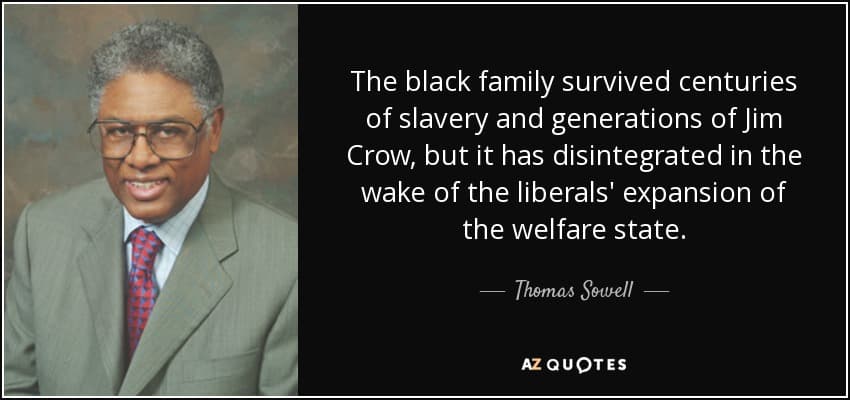Thomas Sowell: Welfare State Drove 67% Rise in Black Single-Parent Households by 1985

Economist Thomas Sowell contends that the expansion of the welfare state, particularly since the 1960s, significantly contributed to the deterioration of the black family structure. According to a tweet from "Thomas Sowell Quotes," he argues that this governmental intervention had a devastating impact on black families. His analysis frequently highlights the dramatic increase in single-parent households within the black community.
Sowell points to a stark statistical shift, noting that "In 1960, before this expansion of the welfare state, 22 percent of black children were raised with only one parent. By 1985, 67 percent of black children were raised with either one parent or no parent." He asserts that black economic progress and family stability were more robust in the decades prior to the widespread implementation of these programs, with poverty rates among black Americans falling substantially between 1940 and 1960.
This perspective aligns with aspects of the controversial 1965 Moynihan Report, "The Negro Family: The Case For National Action," which also raised concerns about the growing number of single-mother families and its potential long-term societal effects. Sowell has often praised Moynihan's foresight in identifying these trends, suggesting that the report was an "honest government report on race."
However, Sowell's arguments are part of a broader, complex debate regarding the factors influencing black family structure. Critics and other academic studies suggest that while welfare policies may have played a role, their impact on the rise of single-parent families is often considered small and inconsistent across various research. Other significant factors cited include "man-in-the-house" rules in welfare programs, which some argue incentivized the absence of fathers, and the profound effects of mass incarceration and the War on Drugs on black communities.
Despite these differing viewpoints, Sowell consistently maintains that the incentives created by welfare policies undermined traditional family structures, leading to adverse social outcomes. His work continues to fuel discussions on the historical and ongoing challenges faced by black families in the United States.